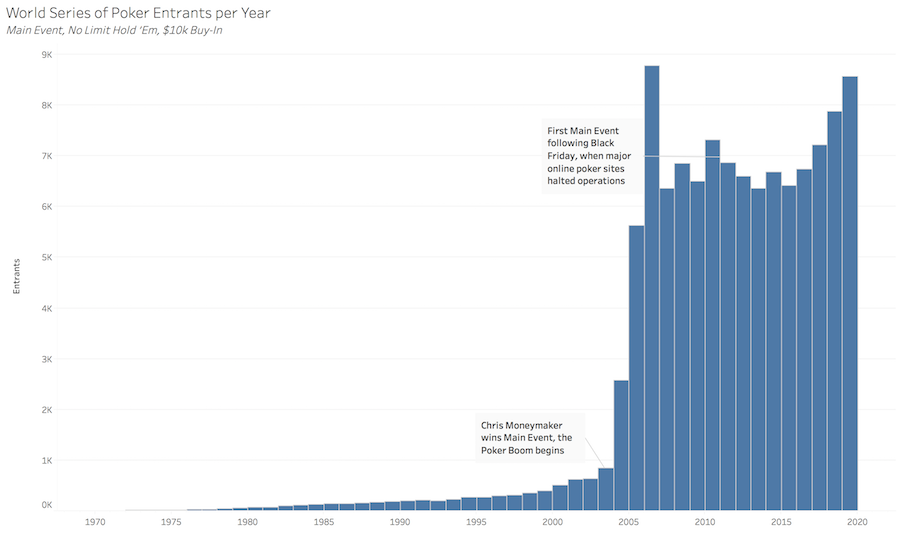Since reading Maria Konnikova’s terrific new book The Biggest Bluff, I have been on a poker kick. She describes her journey to the World Series of Poker Main Event, poker’s biggest stage, and what it is like to be there. This got me interested in the tournament and its history. I knew poker got incredibly popular in the US in the early 2000s and has since cooled off, but wanted to get a sense of the scale.
How Many People Enter the World Series of Poker each year?
The “Poker Boom,” and its subsequent cooling off, is fascinating. Chris Moneymaker is credited for setting off the boom when he won the WSOP in 2003 after winning an online tournament. He was an accountant from Tennessee and inspired people who hadn’t played high-level poker before to try their luck. I was surprised at just how massive the explosion was for the Main event; it grew by around 10x in 3 years.
It seems like there were two massive trends that primed poker for a breakout, and then Moneymaker winning in 2003 was the spark that blew it up.
- First, the widespread adoption of the internet and, in turn, internet poker let people play a lot and opened up the talent pool by orders of magnitude – you no longer had to live near a casino to play against good players for real money
- The addition of pocket cams and odds charts to televised poker made it a much more compelling thing to watch, increasing interest in the game and teaching people how to play
You can look at Google Trends for a sense of overall popularity. Searches for online poker in the US have gone down a lot more than WSOP entrants. It seems like the poker boom created a group of serious players (the kind who will consider paying $10,000 to enter the Main Event) that is “stickier” than the general public. That is an interesting property to cultural fads – they create a subculture of dedicated enthusiasts that lasts longer than the broad societal interest.
You can also see “Black Friday” in the spring of 2011 in both charts, when lawsuits were brought against some of the biggest online poker sites and they shut down. The easy money of the poker boom, when tons of beginners tried their luck playing online, dried up overnight and serious players were left with stiffer competition and fewer options to play.
It looks like entrants to the Main Event declined in the years following Black Friday, but not as much as I would have expected. And the Main Event has been growing substantially over the past few years (although obviously Coronavirus in 2020 throws this all into question).
How International is the World Series of Poker?
I was curious the extent to which the Main Event has become an international affair. Given that online poker lets people around the world learn and play the game, and the prize pool is big enough that it should warrant the trip to Las Vegas for the best players, I’d expect the makeup of the competitors to be quite global.
I looked at the nationalities of players who finished in the money from the WSOP website. I was surprised at the extent to which Americans still dominate the tournament:
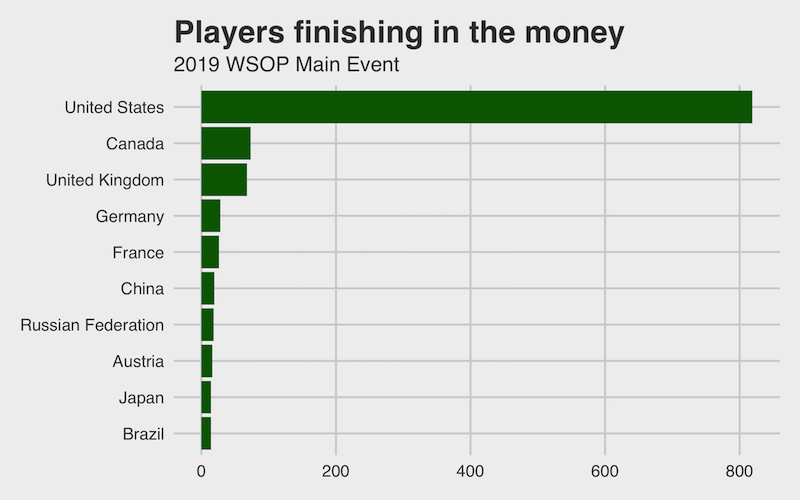
You can see that the percentage of non-US players is increasing over time:
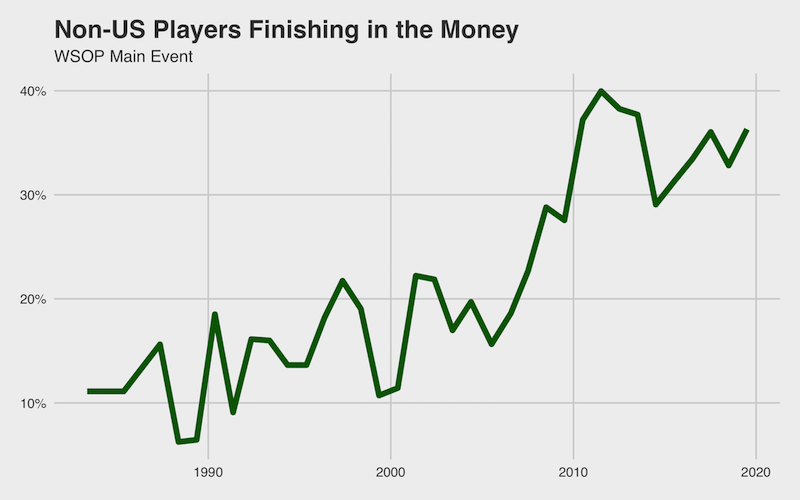
Still, it is a heavily Western competition. The US has by far the most finishers, followed by Canada and Western Europe.
I’m especially surprised there aren’t more Chinese players. Apparently the Chinese government is relatively strict with online poker and gambling in general. The number of Chinese finishers at the WSOP is increasing, though, and there was a section in Konnikova’s book about Macau and how it dwarfs Vegas. Perhaps there will be a poker boom in China.
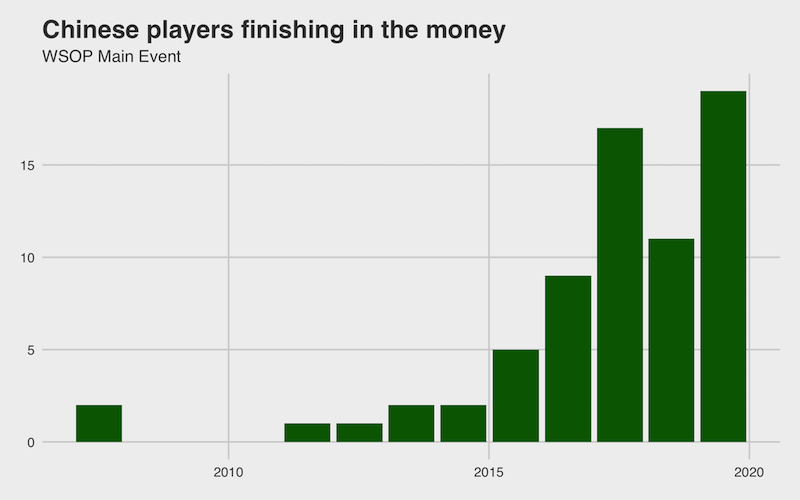
These are the charts for the top 15 countries by number of players over the past ten years. I am curious about what happened with French players; if anyone knows about that reach out to me at joe at this website or on twitter.
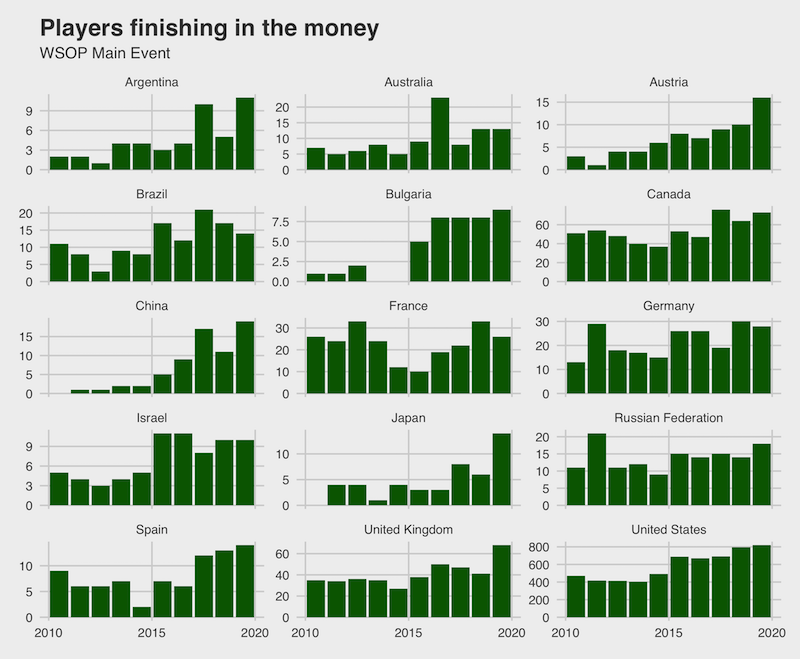
I wonder what other trends might follow this cycle. Perhaps day-trading through apps like Robinhood will be similar–many people, driven by greed and excitement, get involved in the activity, and then regulation catches up.
Thanks for reading! If you enjoy this sort of analysis, sign up below and I’ll email you when I write something new.
